形容词、副词的比较级和最高级的用法:
形容词及副词的比较级和最高级的用法

比较级和最高级一、形容词比较级和最高级的规则其它不规则的变化:二、形容词比较级基本用法1、与than搭配的基本形式(1)名词/代词He is older than me.(2) 动名词/从句Skiing is more exciting than skating.(3) 状语/动词/形容词/副词①much/a lot/ a bit/ a little/ slightly/any/ no/ even/ some/ stillEg: She is feeling a lot/much better today.Do you feel any better today?She is no older than mike.②数词My sister is ten years younger than me.2、特殊搭配1)“比较级+and+比较级”表示“越来越……”eg: He becomes fatter and fatter. She is growing more and more beautiful2)“The +比较级…,the +比较级”表示“越……,越……”The busier he is ,the happier he feels3)表示两者中”较……“时,用the + 形容词比较级+ of 短语来表达。
He is the taller of the two.4)在含有or的选择疑问句中,如果有两者供选择,前面的形容词要用比较级形式。
5)More ...than...的几种用法和含义①more B than A = less A than B. He is more lazy than slow at his work= he is less slow than lazy at his work.②no/not any more/less… than…两个都不(neither)③More than不仅仅是,no Less than(不)少于,more or less 差不多The work is more or less finished.one more=another more Any other+名词单数(名词可以省略)3、修饰比较级的词①a bit, a little, rather, much,far, by far, many, a lot, lots, a great deal, any, still, even(very只修饰原级)②用表示倍数的词或度量名词作修饰语。
形容词副词的比较级和最高级的变化规则及用法
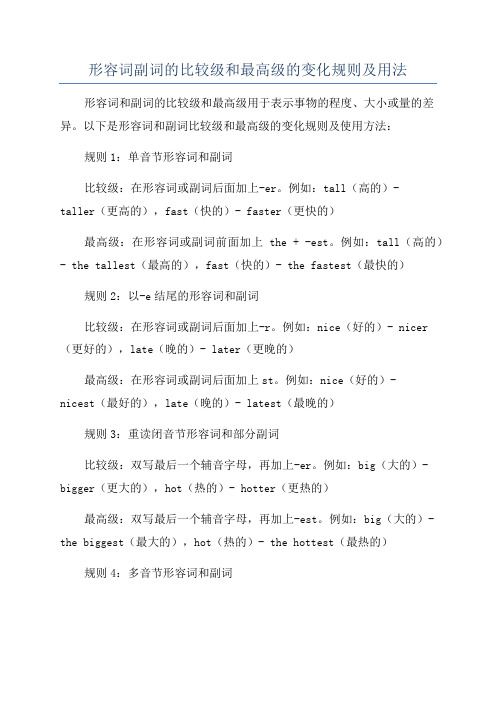
形容词副词的比较级和最高级的变化规则及用法形容词和副词的比较级和最高级用于表示事物的程度、大小或量的差异。
以下是形容词和副词比较级和最高级的变化规则及使用方法:规则1:单音节形容词和副词比较级:在形容词或副词后面加上-er。
例如:tall(高的)-taller(更高的),fast(快的)- faster(更快的)最高级:在形容词或副词前面加上the + -est。
例如:tall(高的)- the tallest(最高的),fast(快的)- the fastest(最快的)规则2:以-e结尾的形容词和副词比较级:在形容词或副词后面加上-r。
例如:nice(好的)- nicer (更好的),late(晚的)- later(更晚的)最高级:在形容词或副词后面加上st。
例如:nice(好的)-nicest(最好的),late(晚的)- latest(最晚的)规则3:重读闭音节形容词和部分副词比较级:双写最后一个辅音字母,再加上-er。
例如:big(大的)- bigger(更大的),hot(热的)- hotter(更热的)最高级:双写最后一个辅音字母,再加上-est。
例如:big(大的)- the biggest(最大的),hot(热的)- the hottest(最热的)规则4:多音节形容词和副词比较级:在形容词或副词前面加上more。
例如:beautiful(美丽的)- more beautiful(更美丽的),carefully(小心地)- morecarefully(更小心地)最高级:在形容词或副词前面加上the most。
例如:beautiful(美丽的)- the most beautiful(最美丽的),carefully(小心地)- the most carefully(最小心地)规则5:不规则形容词和副词有一些形容词和副词的比较级和最高级变化不规则,需通过记忆来掌握。
例如:good(好的)- better(更好的)- the best(最好的),bad(坏的)- worse(更坏的)- the worst(最坏的)使用方法:1. 比较级用于比较两个事物或人的程度、大小或量的差异。
形容词副词的比较级和最高级与用法
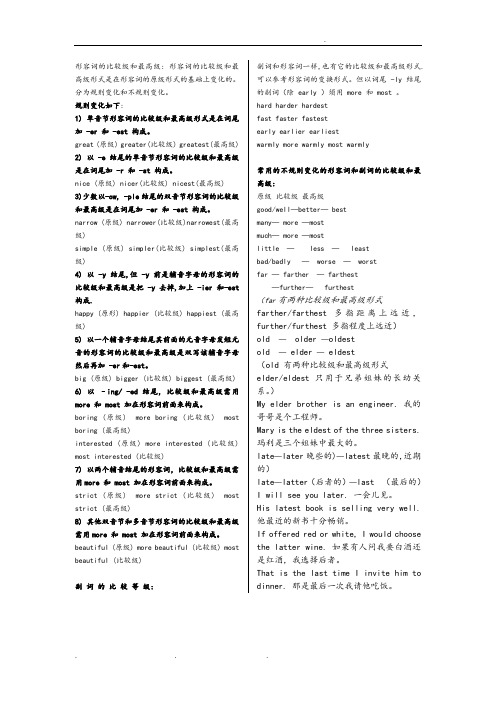
形容词的比较级和最高级: 形容词的比较级和最高级形式是在形容词的原级形式的基础上变化的。
分为规则变化和不规则变化。
规则变化如下:1) 单音节形容词的比较级和最高级形式是在词尾加 -er 和 -est 构成。
great (原级) greater(比较级) greatest(最高级) 2) 以 -e 结尾的单音节形容词的比较级和最高级是在词尾加 -r 和 -st 构成。
nice (原级) nicer(比较级) nicest(最高级)3)少数以-ow, -ple结尾的双音节形容词的比较级和最高级是在词尾加 -er 和 -est 构成。
narrow (原级) narrower(比较级)narrowest(最高级)simple (原级) simpler(比较级) simplest(最高级)4) 以 -y 结尾,但 -y 前是辅音字母的形容词的比较级和最高级是把 -y 去掉,加上 -ier 和-est 构成.happy (原形) happier (比较级) happiest (最高级)5) 以一个辅音字母结尾其前面的元音字母发短元音的形容词的比较级和最高级是双写该辅音字母然后再加 -er和-est。
big (原级) bigger (比较级) biggest (最高级) 6) 以–ing/ -ed结尾, 比较级和最高级需用more 和 most 加在形容词前面来构成。
boring (原级) more boring (比较级) most boring (最高级)interested (原级) more interested (比较级) most interested (比较级)7) 以两个辅音结尾的形容词,比较级和最高级需用more 和 most 加在形容词前面来构成。
strict (原级) more strict (比较级) most strict (最高级)8) 其他双音节和多音节形容词的比较级和最高级需用more 和 most 加在形容词前面来构成。
形容词副词及比较级最高级的用法

形容词副词及比较级最高级的用法形容词:形容词用来修饰名词或代词,描述事物的特征和性质。
副词:副词用来修饰动词、形容词、副词或整个句子,表示一种方式、程度、时间等。
比较级:比较级用来比较两个事物之间的差异,表示更高或更低的程度。
最高级:最高级用来比较三个或三个以上事物之间的差异,表示最高或最低的程度。
形容词、副词的比较级和最高级的构成方法如下:1. 以一般的形容词和副词在词尾直接加-er和-est:big(大)- bigger(更大)- biggest(最大);2. 以辅音字母+y结尾的形容词或副词,变y为i,再加-er和-est:happy(快乐)- happier(更快乐)- happiest(最快乐);3. 以e结尾的形容词或副词,直接加-r和-st:wide(宽)- wider (更宽)- widest(最宽);4. 以重读闭音节结尾且末尾只有一个辅音字母的形容词,双写最后一个辅音字母,再加-er和-est:big(大)- bigger(更大)- biggest (最大);5. 不规则变化:good(好)- better(更好)- best(最好);6. 使用more和most:a. 多音节形容词和副词前面加more表示比较级,加most表示最高级:beautiful(美丽)- more beautiful(更美丽)- most beautiful (最美丽);b. 部分两音节的形容词和副词也可以使用more和most,但与-er和-est比较级共存时一般使用后者:clever(聪明)- cleverer或more clever(更聪明)- cleverest或most clever(最聪明)。
需要注意的是,有些形容词存在不规则变化的情况,需要记忆。
同时,最高级前通常使用定冠词"the"。
形容词副词比较级最高级用法总结
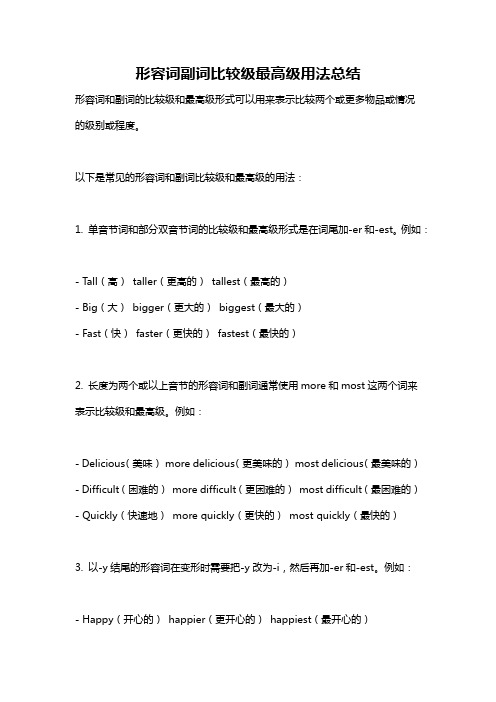
形容词副词比较级最高级用法总结形容词和副词的比较级和最高级形式可以用来表示比较两个或更多物品或情况的级别或程度。
以下是常见的形容词和副词比较级和最高级的用法:1. 单音节词和部分双音节词的比较级和最高级形式是在词尾加-er和-est。
例如:- Tall(高)taller(更高的)tallest(最高的)- Big(大)bigger(更大的)biggest(最大的)- Fast(快)faster(更快的)fastest(最快的)2. 长度为两个或以上音节的形容词和副词通常使用more和most这两个词来表示比较级和最高级。
例如:- Delicious(美味)more delicious(更美味的)most delicious(最美味的)- Difficult(困难的)more difficult(更困难的)most difficult(最困难的)- Quickly(快速地)more quickly(更快的)most quickly(最快的)3. 以-y结尾的形容词在变形时需要把-y改为-i,然后再加-er和-est。
例如:- Happy(开心的)happier(更开心的)happiest(最开心的)- Pretty(漂亮的)prettier(更漂亮的)prettiest(最漂亮的)4. 有一些形容词和副词的比较级和最高级形式是不规则的,需要特别记忆,例如:- Good(好)better(更好的)best(最好的)- Bad(不好的)worse(更不好的)worst(最不好的)- Little(少)less(更少的)least(最少的)- Much(多)more(更多的)most(最多的)在使用比较级和最高级的时候,需要注意以下几点:1. 当比较级表示“比……更……”时,要使用than。
例如,He is taller than his brother.2. 当最高级表示“最……”时,应该加上the。
形容词副词比较级和最高级用法总结
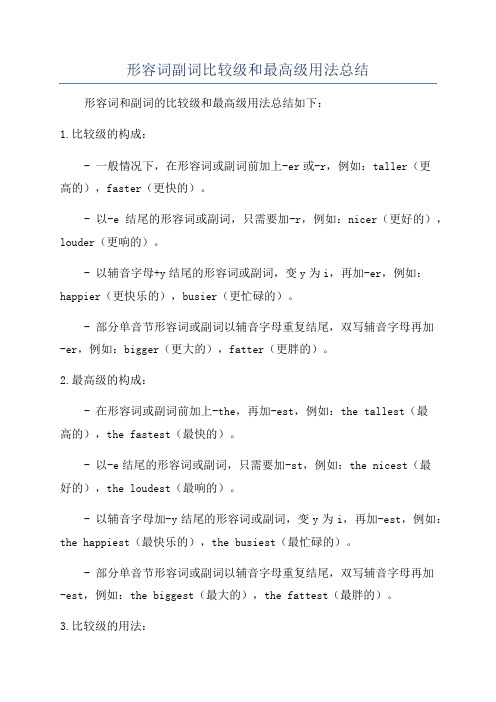
形容词副词比较级和最高级用法总结形容词和副词的比较级和最高级用法总结如下:1.比较级的构成:- 一般情况下,在形容词或副词前加上-er或-r,例如:taller(更高的),faster(更快的)。
- 以-e结尾的形容词或副词,只需要加-r,例如:nicer(更好的),louder(更响的)。
- 以辅音字母+y结尾的形容词或副词,变y为i,再加-er,例如:happier(更快乐的),busier(更忙碌的)。
- 部分单音节形容词或副词以辅音字母重复结尾,双写辅音字母再加-er,例如:bigger(更大的),fatter(更胖的)。
2.最高级的构成:- 在形容词或副词前加上-the,再加-est,例如:the tallest(最高的),the fastest(最快的)。
- 以-e结尾的形容词或副词,只需要加-st,例如:the nicest(最好的),the loudest(最响的)。
- 以辅音字母加-y结尾的形容词或副词,变y为i,再加-est,例如:the happiest(最快乐的),the busiest(最忙碌的)。
- 部分单音节形容词或副词以辅音字母重复结尾,双写辅音字母再加-est,例如:the biggest(最大的),the fattest(最胖的)。
3.比较级的用法:- 表示两个人或物之间的比较,例如:He is taller than me.(他比我高。
- 表示一些人或物在其中一方面的进步或退步,例如:She is getting smarter.(她越来越聪明)。
4.最高级的用法:- 表示三个或三个以上人或物之间的比较,例如:He is the tallest in the class.(他是班级里最高的)。
- 表示人或物在其中一方面的最高水平或程度,例如:She is the smartest student in the school.(她是学校里最聪明的学生)。
形容词与副词的比较级与最高级形式与用法
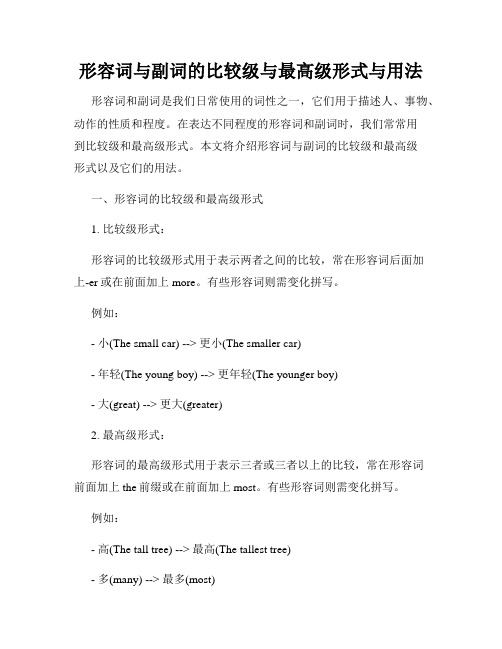
形容词与副词的比较级与最高级形式与用法形容词和副词是我们日常使用的词性之一,它们用于描述人、事物、动作的性质和程度。
在表达不同程度的形容词和副词时,我们常常用到比较级和最高级形式。
本文将介绍形容词与副词的比较级和最高级形式以及它们的用法。
一、形容词的比较级和最高级形式1. 比较级形式:形容词的比较级形式用于表示两者之间的比较,常在形容词后面加上-er或在前面加上more。
有些形容词则需变化拼写。
例如:- 小(The small car) --> 更小(The smaller car)- 年轻(The young boy) --> 更年轻(The younger boy)- 大(great) --> 更大(greater)2. 最高级形式:形容词的最高级形式用于表示三者或三者以上的比较,常在形容词前面加上the前缀或在前面加上most。
有些形容词则需变化拼写。
例如:- 高(The tall tree) --> 最高(The tallest tree)- 多(many) --> 最多(most)二、副词的比较级和最高级形式1. 比较级形式:副词的比较级形式与形容词相同,可以在后面加上-er或在前面加上more。
例如:- 快(He runs fast) --> 更快(He runs faster)- 悄悄地(Quietly) --> 更悄悄地(More quietly)2. 最高级形式:副词的最高级形式也与形容词相同,可以在前面加上most或在副词前面加上the前缀。
例如:- 很(nicely) --> 最(nicest)- 积极地(actively) --> 最积极地(the most actively)三、形容词和副词比较级与最高级的用法1. 更有多样性的比较:有些形容词和副词在比较级和最高级形式中有特殊变化。
例如:- 好(good) --> 更好(better) --> 最好(the best)- 多(多种方式)(many)--> 更多(more) --> 最多(the most)2. 不规则比较:有一些形容词和副词的比较级和最高级形式变化不规则,需特别注意。
形容词和副词的比较级和最高级

形容词和副词的比较级和最高级形容词和副词的比较级和最高级是英语语法中的重要部分,它们用于比较不同事物的程度、大小或质量。
正确使用比较级和最高级可以增强语言表达力,使描述更准确、生动。
本文将详细介绍形容词和副词的比较级和最高级的用法及其变化规则。
一、形容词的比较级和最高级1. 比较级的构成形容词的比较级一般在词尾加上"-er",同时双音节词或多音节词可以在前面加上"more"来表示比较级。
例如:bright - brighterclever - cleverer/more cleverbeautiful - more beautiful2. 最高级的构成形容词的最高级一般在词尾加上"-est",同时双音节词或多音节词可以在前面加上"most"来表示最高级。
例如:bright - brightestclever - cleverest/most cleverbeautiful - most beautiful3. 特殊变化规则部分形容词在比较级和最高级的变化时需注意特殊规则,如:good - better - bestbad - worse - worstfar - farther/further - farthest/furthest二、副词的比较级和最高级1. 比较级的构成副词的比较级一般在词尾加上"-er",同时双音节词或多音节词可以在前面加上"more"来表示比较级。
例如:quickly - quickercarefully - more carefully2. 最高级的构成副词的最高级一般在词尾加上"-est",同时双音节词或多音节词可以在前面加上"most"来表示最高级。
例如:quickly - quickestcarefully - most carefully3. 特殊变化规则部分副词在比较级和最高级的变化时需注意特殊规则,如:well - better - bestbadly - worse - worstfar - farther/further - farthest/furthest三、用法注意事项1. 比较级的用法比较级用于两个事物之间的比较,可以通过加入"than"来表达具体的比较对象。
- 1、下载文档前请自行甄别文档内容的完整性,平台不提供额外的编辑、内容补充、找答案等附加服务。
- 2、"仅部分预览"的文档,不可在线预览部分如存在完整性等问题,可反馈申请退款(可完整预览的文档不适用该条件!)。
- 3、如文档侵犯您的权益,请联系客服反馈,我们会尽快为您处理(人工客服工作时间:9:00-18:30)。
形容词、副词的比较级和最高级的用法:当两种物体之间相互比较时,我们要用形容词或副词的比较级;当相互比较的物体是三个或三个以上时,我们就要用形容词或副词的最高级。
形容词、副词的比较级和最高级的变化规律:1. 单音节形容词或副词后面直接加-er或-esttall—taller—tallest fast—faster—fastest2. 以-e结尾的单音节形容词或副词直接加-r或-stlarge—larger—largest nice—nicer—nicest3. 以-y结尾的形容词或副词,改-y为-i再加-er或-est busy—busier—busiest early—earlier—earliest4. 形容词或副词是重读闭音节时,双写最后的辅音字母,再加-er或-est hot—hotter—hottest big—bigger—biggest5. 多音节形容词或副词前面直接加more或mostdelicious—more delicious—most deliciousbeautiful—more beautiful—most beautiful6. 不规则变化good (well)—better—best bad (badly)—worse—worst形容词、副词的比较级和最高级的句子公式:比较级形容词物体A + am / are / is + 形比 + than + 物体B.I am taller than you.Pasta is more delicious than pizza.副词物体A + 行为动词 + 副比 + than + 物体B.Cheetahs run faster than goats.He studies better than me.最高级1)物体A + am / are / is + the + 形最高级 + 比较范围(of + 人/物,in + 地方).I am the tallest in the class.Pasta is the most delicious food of the three.2)物体A + 行为动词 + 副词最高级 + 比较范围(of + 人/物,in + 地方). Cheetahs run fastest in the world.He studies best of us.一. 词形变换。
比较级最高级large _________________ ___________________fast _________________ ___________________easy _________________ ___________________比较级最高级wet _________________ ___________________good _________________ ___________________important _________________ ___________________well __________________ ___________________bad _________________ ___________________many _________________ ___________________little _________________ ___________________far _________________ ___________________strong _________________ ___________________patient _________________ ___________________safe _________________ ___________________expensive _________________ ___________________二. 选择填空。
1.Birds can fly _____________, eagles can fly_______________than birds. They fly _____________ in theworld. ( high, higher, highest )2. I am _____________ than my brother, but my little sister isthe ______________ of us. (fat, fatter, fattest )3. Which can swim ______________, fish or sharks? ( well, better, best )4. The green book is a _______________ book, but the red oneis much _____________ than the green one. It’s the______________ book in the bookshop. (nice, nicer, nicest )5. Look at that boy, he is running ______________ (fast, faster).6. I think that book is ______________ (good, better) foryou.7. The new library has ______________ (many, more) books than the old one.8. Sally is ______________ (tall, taller) than her cousin.9. Our school is much ______________ (large, larger) than yours.10. Look, Janet is jumping ______________ (high, higher) than Mike.11.Mr Hare runs much ______________ (fast, faster) thanMr Turtle. Mr Hare needn’t run______________ (fast, faster) now.12. In the gym, Tommy is playing table tennis ______________ (well, better) than Jimmy.13. This book is very ______________ (interesting, more interesting) , but that one is______________ (interesting, more interesting) than it.14. The film is the ______________ (horrible, more horrible, most horrible) film of all.15. It’s summer now. The weather is getting _______________. (hot and hot, hotter and hotter, hottest and hottest)16. The U.S.A. is one of _________________ (richer, most rich, the richest) countries in the world.三. 用所给单词的适当形式填空。
1. My school is ______________, but Tom’s school is______________ than mine. And Sally’s school is the______________. (small)2. Rabbits can run ______________, but tigers can run______________ than rabbits, and cheetahs can run______________ of the three. (fast)3.Pig is ______________, but deer is ______________ than pig, and elephant is the______________ (heavy)4. I’m ______________, but she is ______________ than me. (beautiful)5. Every day is ______________. But today is the______________ day I have ever had. (busy)6. I think pizza is the ______________ food of all. (delicious)四. 汉译英。
1.她比我漂亮。
(pretty)_______________________________________________________________ 2.我学习比他们好。
(well)_______________________________________________________________ 3.她是我们中间最漂亮的。
(pretty)_______________________________________________________________ 4.我学习是全班上最好的。
(well)_______________________________________________________________欢迎您的下载,资料仅供参考!致力为企业和个人提供合同协议,策划案计划书,学习资料等等打造全网一站式需求。
